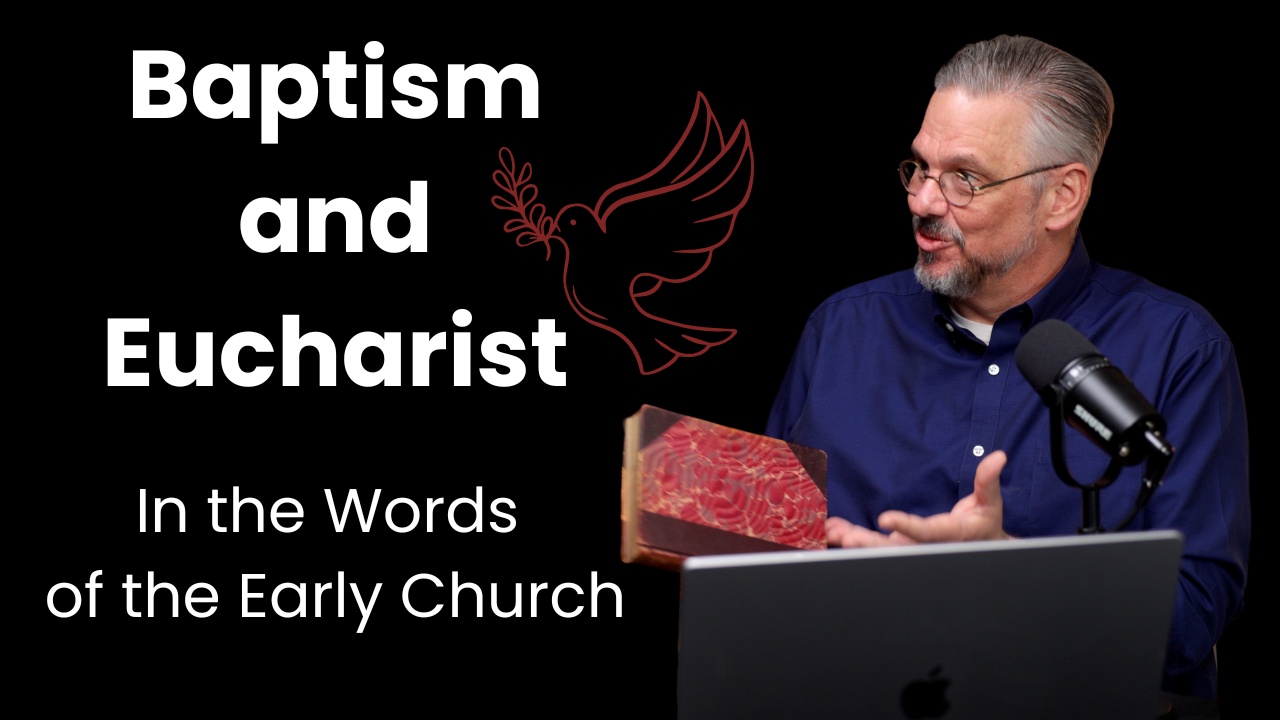Jesus means what He says and He is talking to us! – How Anabaptists Understand Scripture Part 2
In my previous essay, we discussed what is behind the conservative Anabaptist way of life and faith. I shared that after 35 years of study and immersion in this faith community, I have become convinced that the answer is the way we Anabaptists understand and apply Scripture – the Anabaptist hermeneutic. This hermeneutic is driven by three questions: “What if Jesus is who He says He is?”, “What if He means what He says?”, and “What if He’s talking to us?”
I observed that we Anabaptists are a people who emphatically believe Jesus is who He says He is. Therefore, most of us come to Scripture through Him. The 1963 Mennonite Confession of Faith describes this Christocentric approach to the Bible:
“The message of the Bible points to the Lord Jesus Christ. It is to Him that the Scriptures of the Old Testament bear witness, and He is the One whom the Scriptures of the New Testament proclaim. He is the key to a proper understanding of the entire Bible.”
With Christ at the center of our understanding of Scripture, there are two more principles that round out the way we non-conformed Anabaptists approach the Bible.
#2 – What if He means what He says? (Faith in Action)
When my wife and I started our journey toward Anabaptism almost four decades ago, we were not drawn as much by what Anabaptists believed as by how they lived. I remember being moved by how their commitment to their fellowship extended far beyond church functions, and how simplicity and non-conformity collectively guided their daily choices. Coming out of evangelicalism, a tradition that felt long on faith but short on action, we were challenged by how Anabaptists expressed their faith “in shoe-leather.” For them, Christianity wasn’t just something to believe; it was something to do – together. As time passed, we began to appreciate more deeply the worldview that was behind this way of living. Our journey was encapsulated by Wayne Chesley, who quipped, “Anabaptism – come for the lifestyle, stay for the theology.”
Since the movement’s beginning during the Reformation, Anabaptism has always prioritized faith in action. In fact, the first Anabaptists combined a resolute focus on collective obedience to Christ, with a strong sense that they should act on His teachings in their most straightforward sense. This was in stark contrast to the doctrinaire approach of the Reformers. Mennonite historian Harold Bender observed, “The great word of the Reformers was ‘faith,’ while the great word of the Anabaptists was ‘following.’” Early Anabaptist Hans Denck countered the Reformers’ cry of Sola Fide (faith alone) with his own motto: “No one can truly know Christ unless he follows Him in life.” A few years later, in 1539, Menno Simons famously added, “True evangelical faith cannot lie dormant; it clothes the naked, it feeds the hungry, it comforts the sorrowful. It has become all things to all people.”
In the evangelical church of my youth, we related to Christ devotionally, focusing more on who He was than what He taught. We saw Him mainly as Savior and Redeemer, and as a result, our evangelism focused on repentance and belief, anchored on scriptural formulations like “The Romans Road to Salvation” or “The Four Spiritual Laws.” For us, obedience to Christ’s teaching was a peripheral notion, and could even be a dangerous pursuit if left unchecked, because it could lead to the dreaded “works salvation.”
My eyes were opened when, as a new Anabaptist, I began to enter Scripture through the teachings of Christ, and discovered that He was not only Savior and Redeemer, but Master and King! Believe it or not, I was well into my 20s when I first realized that parables like “the sheep and the goats,” or “the wise and foolish builders,” were not about believers vs unbelievers, but about “those who hear these words of mine and put them into practice,” (Matt. 7:24) and those who don’t.
As Anabaptists, we are convinced that Christ means what He says when He challenges us to radical obedience. Jesus spent His ministry years on earth calling His followers not only to confess Him as Savior, but to live out the rule of His transcendent Kingdom of love. In the strength of His Spirit, that is exactly what we Anabaptists are endeavoring to do.
Which leads to the third question…
#3 – What if He’s talking to us? (New Covenant Biblicism)
The early Anabaptists were Biblicists. When one reads their writings and confessions of faith, it becomes obvious that not only was Christ central to their understanding of Scripture, but that He spoke through Scripture directly and authoritatively into their lives. They believed that, with the help of the Spirit, the truths of the Bible were accessible to all, regardless of position or education, and that Scripture should be taken at face value – and acted upon! They had little tolerance for “human doctrines, clever reasoning, nor twisting of Scriptures, nor glosses, nor imaginations…but only the plain Scripture” (Menno Simons).
Their devotion to Christ drew them predominantly to the teachings of Jesus and the apostles. This didn’t mean they felt the Old Testament was unimportant or any less true; to them, it was a rich source of inspiration and understanding about God’s redemptive work throughout human history. However, they also recognized that their calling as Christians was, first and foremost, “to be conformed to the image of [God’s] Son” (Rom. 8:29).
This New Covenant Biblicism continues to guide much of our conservative Anabaptist community to this day, as we strive together to live out the simple directives of Christ and his apostles. Our Biblicism is what distinguishes us from our more acculturated/progressive Anabaptist cousins, who are increasingly likely to spiritualize or contextualize many of the Scriptures that we conservative Anabaptists take literally. This Christocentric Biblicism also differentiates non-conformed Anabaptism from other Christian traditions, like evangelicalism (which teaches from a “flat Bible” – all Scripture essentially given equal voice), fundamentalism (which is more Bibliocentric than Christocentric), Catholicism (with its hierarchical/tradition-based approach), Calvinism (and its Paul-centric hermeneutic), and liberal Christianity (which often makes Scripture contemporary and relative).
We conservative Anabaptists have decided that Jesus clearly is talking to us! In the Bible, we find a faithful account of His life, His instructions, His miracles, His death and resurrection, along with the witness of His prophets and apostles. Scripture offers us a clear picture of what Christ wants us to know as we strive, with the Spirit’s help, to submit our lives to Him.
Putting it Together
The Anabaptist hermeneutic is, in a word, discipleship – following Jesus into Scripture. Historian Harold Bender tells us that for the original Anabaptists “[discipleship] was a concept which meant the transformation of the entire way of life of the individual and of society so that it should be fashioned after the teachings and example of Christ.”1 When Anabaptism is at its best, it is a worldview wholly surrendered to Jesus and given to the work of His Kingdom.
Of course, we must acknowledge that Anabaptism is not always at its best – and not all Anabaptists live by or even recognize the hermeneutic that undergirds our expression of faith. Sadly, for conservative Anabaptists, invasive perspectives like fundamentalism and evangelicalism have made inroads into our churches, and threaten to erode the foundation of our collective witness.2 Some Anabaptists seem to believe we are simply “Baptists with head coverings,” not recognizing that this is an unsustainable proposition. The way we non-conformed Anabaptists live out our faith is a direct result of our hermeneutic of direct biblical obedience to Jesus. [Need proof? Consider the biblical source of the “distinctives” listed in Part 1 of this blog, and ask yourself why fundamentalists and evangelicals don’t share these same convictions]. If we Anabaptists lose our hermeneutic, we lose the basis for our identity as a people.
Sadder yet, not all non-conformed Anabaptists have a living relationship with Jesus. It is entirely possible to belong to a Christ-informed culture and yet remain in spiritual darkness. When culture usurps the throne of Christ in our lives, we are nothing but “whitewashed tombs, which outwardly appear beautiful, but within are full of dead people’s bones” (Matt. 23:27).
Yet, when the living Christ reigns in His rightful place, and sits at the center of our understanding of Scripture, this biblical worldview is a pearl of great price, because it beckons us to give all we are and all we have to King Jesus. You see, in the end, it’s not about Anabaptism at all. It’s really about being “a people who believe that Jesus is who He says He is, that He means what He says, and that He’s talking to us!”3
__________________________________
1 For more insight from Harold Bender on early Anabaptism read, The Anabaptist Vision (1944) Return to context⬏
2For more on fundamentalism and its effect on conservative Anabaptism see Anabaptist Perspectives’ resource, Fundamentalism and Anabaptism Return to context⬏
3I first heard this statement expressed about 25 years ago by Mennonite minister Lynn Miller of West Liberty, Ohio Return to context⬏
[All Scripture quoted from the English Standard Version]
Tags:









Leave a Reply